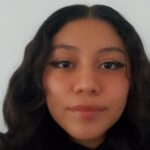
by Maura Adela Cruz
Coming from a low-income Indigenous Oaxacan community, the library was among the few educational resources available in my hometown. Growing up, it was not only a space for reading and studying, but for research, creativity, and design. From academic tutoring, to crochet circles, and English language classes, our public library held many services for the community. However, despite the multitude of resources available, they were inaccessible to the people of my town. A lack of awareness, lack of time, and language barriers are only some of the reasons that the library resources were inaccessible in the context of my community. Due to the lack of accessibility, my Indigenous Oaxacan community came together to form our own spaces, programs, and organizations. We sought to make resources available and accessible in a way that centered our interests and needs. Because of my aforementioned experiences, I became quickly familiarized with the design thinking process and noticed many similar patterns occurring in Berkeley.
Attending Berkeley as a low-income and first-generation Indigenous student, I noticed the situation mirrors that of my hometown. Although the university offers a plethora of resources for students to enjoy, these resources are often not accessible to students of marginalized backgrounds. Prior to the Undergraduate Library Fellowship, I personally had very little awareness of the extent of resources and services available in library spaces.
I joined the Making team to help encourage students to use the Makerspace and figure out ways to increase accessibility to this wonderful resource. Throughout the semester, we worked as a team to brainstorm, listen to UC Berkeley students, identify our target audience and a problem statement. Understanding multiple student perspectives, and coming together as a group was important to the process of creating and initiating potential solutions to the issues at hand.
One part of the process that stood out to me were the student interviews we conducted to gain user insights on Moffitt Library and the Makerspace. It was helpful to validate my experiences and also go beyond my experiences. Through the interviews and observations I was able to consider other barriers marginalized students face with being able to use the library resources, specifically in the Makerspace. This activity helped me apply the lesson to observe, empathize, and question, as was discussed in our Makerspace team meetings. The user interviews were crucial to understanding the situations and sentiments of several UC Berkeley students, and identifying a problem statement to work on solving. It allowed us to learn more about the target audience and who would benefit from our efforts to make the Makerspace more accessible.
After identifying the target audience and problem statement, we met as a team to come up with solutions and actions that can be taken on our behalf to reach our goal for increased accessibility. Throughout these past few months, the process has been centered on coming together and taking into account the users needs. How can our resources and space best benefit every user, especially students who have been historically excluded and marginalized? We asked ourselves many questions, came together as a team to share our experiences, sought varying perspectives from other UC Berkeley students, and received feedback from our mentors and the Research team. To put it simply, my experience in the fellowship has solidified that solutions and next steps towards accessibility take a collective effort.